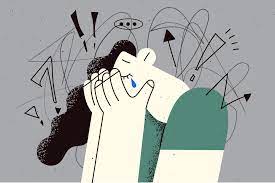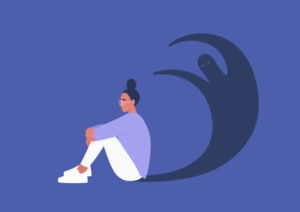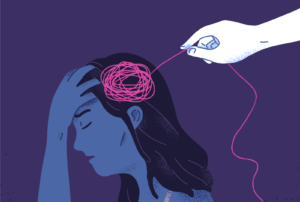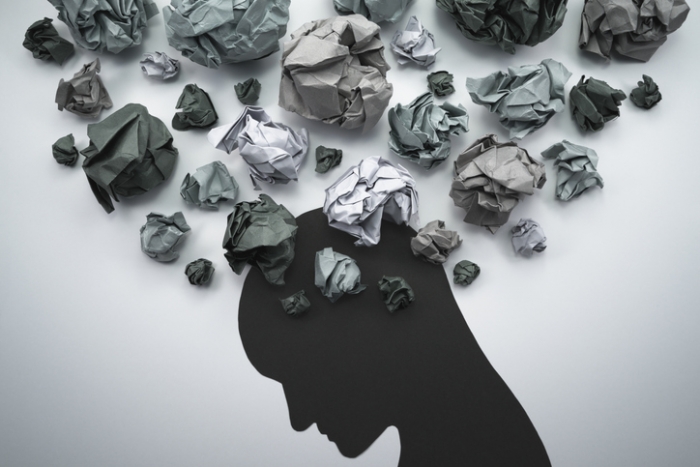Anxiety is a feeling of unease, worry, or fear that can be mild or severe. For some people, anxiety is a normal and healthy response to stress. However, for others, anxiety can become chronic and interfere with daily life. If you are struggling with chronic anxiety, this guide will provide you with information on what chronic anxiety is, the symptoms, how it is treated, and how to live a full life despite your condition.
Contents
Defining Chronic Anxiety
Chronic anxiety, also known as generalized anxiety disorder (GAD), is an ongoing condition that causes symptoms of anxiety. GAD can interfere with daily life, making it difficult to concentrate, sleep, or eat. People with chronic anxiety often feel like they are in a state of constant worry or fear, even when there is no apparent reason for their feelings.
Although anxiety is a natural emotion that everyone experiences from time to time, chronic anxiety is different. Chronic anxiety is long-lasting and can be triggered by both external and internal factors. It is also characterized by symptoms that are more severe than those of normal anxiety.
Chronic anxiety is a long-lasting condition that causes symptoms of anxiety. These symptoms can interfere with daily life and make it difficult to concentrate, sleep, or eat. People with chronic anxiety often feel like they are in a state of constant worry or fear, sometimes even without a reason.
Symptoms of Chronic Anxiety

The symptoms of chronic anxiety can vary from person to person. However, there are some common symptoms that people with GAD often experience. These symptoms include:
- Excessive worry
- Restlessness
- Irritability
- Sleep problems
- Easily fatigued
- Constantly feeling like you’re on the edge
- Muscle tension
- Difficulty concentrating
- Sweating
- Anxiety that is out of proportion to the situation
- Nausea
- Shortness of breath
These symptoms can be mild, moderate, or severe. They may also come and go, or they may be constant. If you are experiencing any of these symptoms, it is important to talk to your doctor. They will be able to help you determine if your symptoms are due to chronic anxiety or another condition.
Causes

The causes of chronic anxiety are not fully understood. However, some factors may contribute to the development of GAD. These include:
Genetics: Anxiety can run in families, so you may be more likely to develop GAD if someone in your family has it. Though it is still unclear how exactly anxiety is passed down through families, researchers believe that both genetic and environmental factors play a role.
Brain chemistry: Imbalances in certain chemicals in the brain may play a role in anxiety disorders. This imbalance may be due to a genetic predisposition or life experiences. These chemicals include serotonin, norepinephrine, and gamma-aminobutyric acid (GABA).
Environment: Certain environmental factors (such as stress) may trigger anxiety. These can be either short-term or long-term stressors. For example, a death in the family or a divorce can lead to long-term anxiety, while a busy work schedule or an upcoming exam can cause short-term anxiety.
Life experiences: Certain life events can trigger chronic anxiety. These events may be positive (such as marriage or starting a new job) or negative (such as the death of a loved one or divorce).
Other disorders: Having another mental health disorder such as depression, ADHD, PTSD, or bipolar disorder, among others, can increase your risk of developing GAD.
An individual may develop anxiety due to one or multiple of these reasons. It is important to assess all of these for a better understanding of the disorder.
Effects On Everyday Life

Chronic anxiety can have a significant negative impact on your life. It manifests itself in daily life in the following ways:
Avoidance of certain situations: People with GAD often avoid certain activities or situations that they perceive as dangerous or threatening. For example, they may avoid driving on the highway or going to social gatherings.
Interference with work or school: Chronic anxiety can interfere with your ability to concentrate, which can make it difficult to do well at work or school. It may also lead to absenteeism as you try to avoid triggering situations.
Relationship problems: Anxiety can cause problems in both personal and professional relationships. You may be withdrawn and have difficulty communicating with others. Your relationships may suffer as a result.
Health issues: Chronic anxiety can lead to physical health problems such as headaches, stomach problems, and difficulty sleeping. It can also make you more susceptible to illnesses such as colds and flu. It also can be a factor for other mental illnesses such as depression.
These effects can deplete the quality and satisfaction of life, causing a great deal of negative feelings towards life.
Diagnosis
If you are experiencing symptoms of anxiety, it is important to see your doctor. They will ask you about your symptoms and medical history. They may also do a physical exam to rule out other conditions that could be causing your symptoms. If they believe you have GAD, they may refer you to a mental health specialist for further evaluation.
To diagnose GAD, the mental health specialist will talk to you about your symptoms and how long you have been experiencing them. They will also ask about your family history of anxiety and any other mental health disorders you may have. They may use one or more of the following methods to make a diagnosis. Some common anxiety tests include:
- Hamilton Anxiety Rating Scale (HARS)
- Beck Anxiety Inventory (BAI)
- Spielberger State-Trait Anxiety Inventory (STAI)
- Zung Self-Rating Anxiety Scale
- Yale-Brown Obsessive Compulsive Scale
These tests help to assess the severity of your symptoms and how they are impacting your life. After the mental health specialist has evaluated you, they will give you a diagnosis.
Treatment

There are several treatment options available for chronic anxiety. The most common treatments are medication and therapy.
Medication
Medication can be used to manage the symptoms of anxiety. The type of medication prescribed will depend on the severity of your symptoms and your overall health. Common types of medication used to treat anxiety:
Selective serotonin reuptake inhibitors (SSRIs): SSRIs are the most commonly prescribed type of medication for anxiety. They work by increasing levels of serotonin in the brain, which helps to improve mood and reduce anxiety.
Serotonin and norepinephrine reuptake inhibitors (SNRIs): SNRIs work similarly to SSRIs, but they affect both serotonin and norepinephrine. These medications are often used to treat depression, but they can also be effective for anxiety.
Tricyclic antidepressants (TCAs): TCAs are a type of antidepressant that can be used to treat anxiety. They work by increasing the levels of serotonin and norepinephrine in the brain.
Benzodiazepines: Benzodiazepines are a type of medication that is typically used to treat anxiety on a short-term basis. They work by reducing the symptoms of anxiety and helping you to feel calm and relaxed.
Beta-Blockers: Beta-blockers are a type of medication that is typically used to treat heart conditions. However, they can also be effective in treating the physical symptoms of anxiety, such as racing heart and trembling.
Therapy
Seeking professional help is an important step in managing chronic anxiety. A therapist can provide you with tools and strategies for coping with anxiety. They can also offer support and understanding. If you are struggling to cope with your anxiety, seek professional help from a mental health provider today. Therapy is another treatment option for chronic anxiety. It can be used alone or in combination with medication. Other types of therapy that may help treat anxiety include:
Cognitive-behavioral therapy: CBT is the most common type of therapy used to treat anxiety. CBT works by helping you to identify and change the thoughts and behaviors that are contributing to your anxiety.
Exposure therapy: Exposure therapy helps you to face your fears and learn how to cope with them. It helps you to gradually confront the things that make you anxious, in a safe and controlled environment.
Acceptance and commitment therapy (ACT): ACT is a type of therapy that helps you to accept your thoughts and feelings, without trying to change them. It also helps you to commit to taking action, despite your anxiety.
Mindfulness-based stress reduction: Mindfulness-based stress reduction (MBSR) is a type of therapy that teaches you to be more aware of your thoughts and feelings, without judgment. It helps you to focus on the present moment and learn how to cope with stress healthily.
Counseling: Counseling is a type of therapy that can help you to deal with the emotions and stress that associate with anxiety. It helps you to talk about your experiences and learn how to manage your anxiety healthily.
Support Groups: Support groups provide a safe and supportive environment for people with anxiety. They can help share information and coping strategies, and they can also provide social support.
Self Help Strategies
In addition to medication and therapy, there are also several things you can do on your own to manage your anxiety. These self-care tips can help to reduce your symptoms and improve your overall well-being:
Get regular exercise: Exercise can help to reduce stress and improve your mood. It can also help to improve sleep, which can be helpful if you are experiencing insomnia due to anxiety.
Practice relaxation techniques: Relaxation techniques such as yoga, meditation, and deep breathing can help to reduce stress and promote relaxation.
Avoid caffeine: Caffeine can make anxiety worse by increasing your heart rate and making you feel jittery. Reducing the intake of caffeine can help to reduce symptoms of anxiety.
Reduce alcohol consumption: Alcohol can worsen anxiety by causing dehydration and interfering with sleep. It can also interact with anxiety medication.
Limit screen time: Too much time spent on screens can increase stress and make it difficult to focus. This can make anxiety worse. Managing the time you spend on a screen can help to reduce symptoms of anxiety.
Make time for leisure activities: Doing things that you enjoy can help to reduce stress and improve your mood. It can also provide a distraction from anxious thoughts. You can try activities such as reading, listening to music, or spending time outdoors.
Eat a healthy diet: Eating a healthy diet can help to improve your mood and reduce stress. Incorporating foods that are high in omega-three fatty acids, such as salmon and flax seeds, can be especially helpful.
Get enough sleep: Sleep deprivation can make anxiety worse. Make sure to get at least seven to eight hours of sleep each night.
Journal: Writing down your thoughts and feelings can help to reduce stress and improve your mood. It also can help you to identify any patterns or triggers that may be contributing to your anxiety.
Manage stress: Stress management techniques such as time management, problem-solving, and assertiveness training can help you to better cope with stressful situations.
Seek social support: Social support can help you to feel connected and less alone. Talk to friends and family members about your anxiety, or join a support group for people with anxiety disorders.
Anxiety is a normal emotion that everyone experiences at one point or another. However, for some people, anxiety becomes chronic and lasts for an extended period. If you are struggling with chronic anxiety, know that you are not alone. There are many resources and treatments available to help you manage your anxiety healthily. With treatment, support, and self-care, you can live a full and satisfying life despite your anxiety.
Conclusion
In conclusion of the above, it is evident that many things can be done to manage chronic anxiety. It is important to seek professional help if the anxiety is proving to be too much to handle on one’s own. Many self-help strategies can be employed to lessen the symptoms of anxiety. Above all, it is crucial to remember that you are not alone in this and that help is available should you need it.
For more information, please contact MantraCare. Anxiety is a common mental health condition characterized by persistent feelings of worry, fear, and apprehension. If you have any queries regarding Online Anxiety Counseling experienced therapists at MantraCare can help: Book a trial Anxiety therapy session


